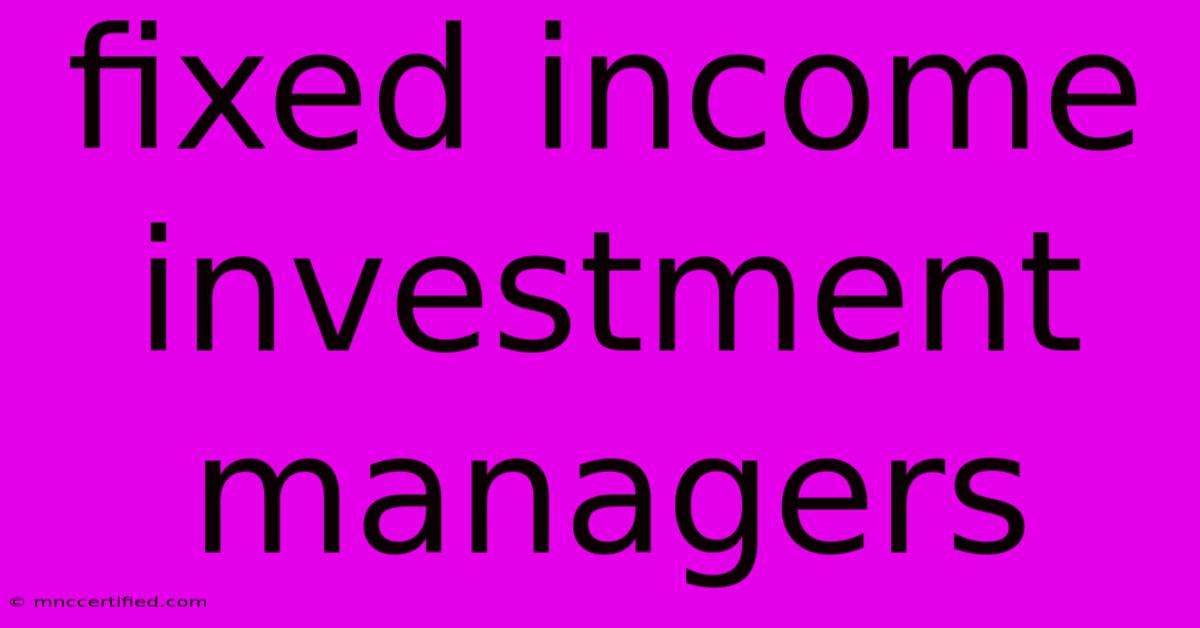Fixed Income Investment Managers

Table of Contents
Fixed Income Investment Managers: Navigating the Bond Market for Optimal Returns
Fixed income investment managers are the financial professionals who navigate the complex world of bonds and other fixed-income securities to generate returns for their clients. They play a crucial role in portfolio diversification and risk management, making them essential players in both individual and institutional investing. This comprehensive guide explores the role, responsibilities, and strategies employed by these skilled professionals.
Understanding the Role of a Fixed Income Investment Manager
A fixed income investment manager's primary responsibility is to maximize returns while minimizing risk within a portfolio of fixed-income assets. This involves a deep understanding of various bond types, interest rate movements, credit risk, and macroeconomic factors. Unlike equity managers who focus on company growth, fixed-income managers focus on the characteristics of the debt instruments themselves.
This includes:
- Bond Selection: Identifying undervalued bonds with attractive yields and manageable risk profiles. This requires extensive research into issuers' creditworthiness, market conditions, and economic forecasts.
- Portfolio Construction: Building diversified portfolios tailored to specific investor objectives and risk tolerances. This might involve a mix of government bonds, corporate bonds, municipal bonds, and other fixed-income instruments.
- Risk Management: Implementing strategies to mitigate various risks associated with fixed income investments, such as interest rate risk, credit risk, inflation risk, and liquidity risk. This often involves sophisticated hedging techniques.
- Performance Monitoring: Regularly tracking portfolio performance against benchmarks and adjusting strategies as needed to optimize returns.
Types of Fixed Income Investment Managers
Fixed income managers can be categorized in several ways, based on their investment style, strategies, and the types of clients they serve:
- Active Managers: Actively select individual bonds based on their research and analysis, aiming to outperform market benchmarks. They leverage their expertise to identify mispriced securities and capitalize on market inefficiencies.
- Passive Managers: Focus on replicating a specific bond index, such as the Bloomberg Barclays Aggregate Bond Index. They prioritize low costs and efficient tracking of the index's performance.
- Quantitative Managers (Quant Managers): Use sophisticated mathematical models and algorithms to identify investment opportunities and manage risk. They rely heavily on data analysis and quantitative techniques.
- Specialized Managers: Focus on niche areas within fixed income, such as high-yield bonds, emerging market debt, or mortgage-backed securities.
Key Strategies Employed by Fixed Income Investment Managers
Fixed income managers utilize a variety of strategies to achieve their investment objectives. Some of the most common strategies include:
- Interest Rate Anticipation: Predicting future interest rate movements and adjusting portfolio duration accordingly. A longer duration increases sensitivity to interest rate changes.
- Yield Curve Analysis: Examining the relationship between yields and maturities of bonds to identify potential investment opportunities. This helps in determining the optimal bond maturity profile.
- Credit Analysis: Thoroughly assessing the creditworthiness of bond issuers to minimize the risk of default. This involves examining financial statements, industry trends, and macroeconomic factors.
- Sector Rotation: Shifting investments between different sectors of the fixed-income market based on anticipated economic performance and market trends.
- Duration Management: Controlling the average maturity of a bond portfolio to manage interest rate risk. Shorter duration reduces interest rate sensitivity.
Choosing the Right Fixed Income Investment Manager
Selecting the right fixed income investment manager is crucial for achieving investment goals. Consider the following factors:
- Investment Philosophy and Style: Align the manager's investment approach with your risk tolerance and investment objectives.
- Performance Track Record: Review the manager's historical performance, considering both absolute returns and risk-adjusted returns.
- Fees and Expenses: Compare the fees charged by different managers to ensure they align with your investment budget.
- Team Expertise and Resources: Assess the manager's team's experience, research capabilities, and available resources.
- Client References and Testimonials: Gather feedback from other clients to gain insights into the manager's performance and client service.
Conclusion:
Fixed income investment managers play a vital role in the financial markets, providing expertise and managing risk within the bond market. Understanding their roles, strategies, and selection criteria is crucial for investors seeking to optimize their fixed-income portfolios. By carefully considering the factors outlined above, investors can effectively partner with a fixed-income manager to achieve their financial objectives.

Thank you for visiting our website wich cover about Fixed Income Investment Managers. We hope the information provided has been useful to you. Feel free to contact us if you have any questions or need further assistance. See you next time and dont miss to bookmark.
Featured Posts
-
Mobile Home Insurance In Arizona
Nov 22, 2024
-
Is Alliant Health Insurance Good
Nov 22, 2024
-
Best Nfl Cards To Invest In 2023
Nov 22, 2024
-
18 Year Old Briton Faces Dubai Prison
Nov 22, 2024
-
Is Panvel A Good Place To Invest
Nov 22, 2024